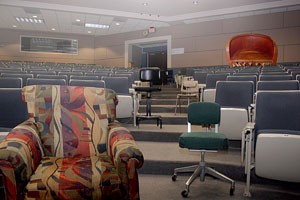Class availability has been a fly in George Gehrels’ eye for more than 30 years.
In the 1970s, he struggled to find the courses he needed as a UA undergraduate and now, as a geosciences professor, he must turn away eager students from his inundated general education class while seated others wait to drop it that evening.
As chair of the Undergraduate Council, Gehrels has worked throughout the spring to devise ways to create more seats for students in popular, high-volume majors such as communication, political science and psychology.
He’ll make his recommendations this fall, with the hope of adding “”several thousand”” new seats in short order.
“”We really need to tackle some of the issues that have been expressed by students this semester,”” he said.
The council’s first recommendation centers on students’ use of the Grade Replacement Opportunity, or GRO, which allows for grades of C, D and E to be replaced by repeating the course.
He will lobby for GROs to be granted only if students receive a grade of D or lower, under the rationale that a C is an “”adequate grade”” and current qualifications put too many students back into courses.
Council members found that students enrolled over the past six years have used GROs in part to take courses in excess of 10 times, according to data from the Office of the Registrar and Assessment and Enrollment Research.
The council will recommend students be allowed to take a single course only twice, perhaps three times in case of extreme circumstances, Gehrels said.
Also this fall, the council will be delving into how to curb what members call “”course shopping,”” when students stockpile classes they’re considering taking, to the detriment of students who need them to fulfill major, minor and graduation requirements.
Alex Paalborg, a history junior and an academic affairs chair for the Associated Students of the University of Arizona, used his experiences in signing up for classes to inform the roughly 20-member council on the phenomenon as its only undergraduate member.
“”It ties up the whole system,”” he said. “”You have kids who are signed up for 18 units when they only need 12. Those are two courses that students who need those classes for their majors can’t get. We have to take care of that.””
Gehrels sees course shopping as being a prime obstacle in creating new seats, although he acknowledges that limiting the number of courses students can register for each semester would be “”very difficult.””
“”There are certain situations where students do well taking 21 units,”” he said. “”There’s where the advisers are important.””
Jessica Corl, a psychology senior, had mixed feelings on the council’s GRO recommendation.
“”It depends on your situation,”” she said. “”If you have a C and you want to boost up your GPA – say, for grad school – I think that’s fine. A C in a psych class doesn’t look good on a transcript.””
She said she hadn’t course-shopped before but knew of at least one friend who did it avidly, picking up “”20-something”” credits every semester before deciding on the best fits.
“”I’ve never had a problem with it, but there should be something in place so people don’t abuse the option,”” Corl said.









